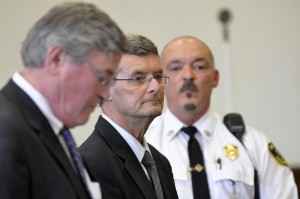The Post-Star
February 12, 2011
http://poststar.com/news/opinion/editorial/article_7905d1de-3645-11e0-8543-001cc4c002e0.html
 |
| Gary Mercure, former associate pastor of Our Lady of the Annunciation Church in Queensbury, stares at the Jury as a guilty verdict is read after being tried in Berkshire County Superior court for the rape of two altar boys in the 1980s, Thursday Feb 10, 2011, Pittsfield, Massachusetts. (Photo by Ben Garver/The Berkshire Eagle) |
Justice was finally served, no thanks to New York state.
Frankly, we got lucky.
Gary Mercure will finally get the prison sentence he has long deserved for repeatedly raping altar boys more than 20 years ago while serving as an associate pastor at Our Lady of the Annunciation Church in Queensbury.
But Thursday's conviction in Berkshire Superior Court in Pittsfield, Mass., only came about because Mercure took the boys on a field trip to the Berkshires, which made him eligible for prosecution in Massachusetts. Had the crimes only occurred in New York state, Mercure would still be a free man, just another child rapist who slipped through the system.
That's because the statute of limitations for which an individual can be prosecuted in New York for certain child molestation crimes is only five years past the alleged victim's 18th birthday. That means prosecutors would have to bring charges before the victims turned 24, or else the perpetrator goes free.
The five victims in the Mercure case were as young as 8 when the priest began abusing them, but they only came forward about three years ago, when they were in their 30s.
Massachusetts law allows prosecutors to prosecute child molesters 15 years after their 16th birthday, or before they've reached their 32nd birthday. The clock doesn't run while the suspect is living outside the state, which means prosecutors there could go after rapists like Mercure for many years beyond the victims' age of 32.
The states with extended statutes of limitations recognize that it often takes many years - often when victims are well into adulthood - for a victim to either remember, acknowledge or have the courage to come forward to report the crimes committed against them as children.
But efforts in New York to extend the statute of limitations to 10 years beyond the victim's 18th birthday have failed in the Legislature each year from 2006 through 2010, largely due to staunch opposition from the Catholic Church, defense lawyers and the Republican leadership in the Senate.
There are some legitimate concerns about extending statutes of limitations, particularly when it comes to the issue of defendants' rights. Defense lawyers claim that the longer a case goes on, the more difficult it is to defend a suspect. As evidence and witnesses age or disappear, such cases often become a matter of the victim's word against the defendant's. And juries tend to believe victims, particularly when it involves child abuse or the church.
The Catholic Church's opposition to the bill has less to do with protecting victims or defendants, and more to do with protecting its own finances and reputation. Lobby groups representing the church and its bishops have contended that if all the victims of sex abuse by priests could successfully bring litigation or prosecution without limit, the church would go bankrupt from lawsuits.
Limiting prosecutions because of the potential unfairness to defendants then puts victims at a disadvantage. While the criminals hide and wait for the statute of limitations to expire, victims may be just coming to terms with what happened to them.
It's also untrue that a defendant can't get a fair trial so long after the crimes occur. As we saw with the Mercure case, credible witness testimony, combined with modern forensic evidence techniques, makes legitimate and successful prosecutions possible, even decades after the crime was committed.
Other states like Massachusetts, Delaware, California and Pennsylvania have acknowledged the psychological impacts of sex abuse and the length of time it often takes for victims to come forward by extending the statutes of limitation on certain child sex crimes.
It's time for New York state to make sure its own victims of child sex abuse have enough time to bring their allegations to light, and that prosecutors have enough time to bring dangerous sexual predators to justice.
Local editorials represent the opinion of The Post-Star editorial board, which consists of Publisher Rick Emanuel, Editor Ken Tingley, Editorial Page Editor Mark Mahoney and citizen representative Mike Wild.
Any original material on these pages is copyright © BishopAccountability.org 2004. Reproduce freely with attribution.